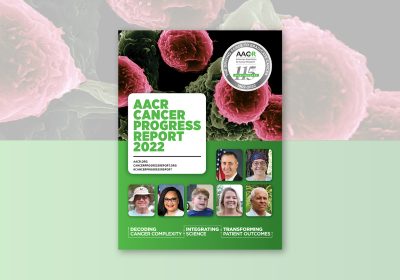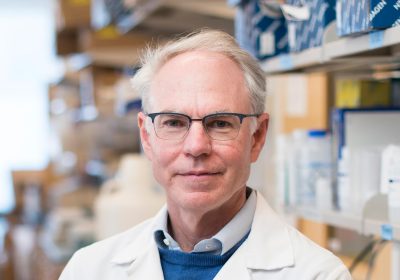
The AACR’s Global Reach
When Frank McCormick, PhD, was named the chair of the International Affairs Committee (IAC) of the American Association for Cancer Research (AACR) in 2014, his goal was to build upon existing relationships with cancer organizations outside the United States and expand the AACR’s international outreach. As he put it, he hoped to generate a rising tide to lift all boats.
“The idea was to build a more comprehensive approach that addressed different needs in different areas [of the world], with a long-term, systematic evaluation of how the AACR could have an impact,” said Dr. McCormick, a past president of the AACR in 2012-2013 and a professor at the University of California, San Francisco Helen Diller Family Comprehensive Cancer Center.
The challenge was ensuring that relationships forged would be mutually beneficial. The AACR was eager to pursue activities that would make the most of its strengths—raising awareness of cancer research, developing infrastructure for translational research, and convening meetings, to name a few—but it was crucial that these activities address an unmet need in the regions where they were undertaken.
Less than a decade after the International Affairs Committee was established, the AACR administers programs in 12 countries and serves a membership spread across 120 countries. Three in 10 AACR members live outside the U.S. and Canada. The core tenets established under Dr. McCormick serve as a foundation for the strides being made by current IAC chair Elizabeth M. Jaffee, MD, an AACR past president in 2018-2019 and the deputy director of the Sidney Kimmel Comprehensive Cancer Center at Johns Hopkins University in Baltimore.
“Frank McCormick has set the goals. and I plan to expand upon these goals,” said Dr. Jaffee. “I also hope to enhance initiatives that train the next generation of cancer researchers in these countries with programs and workshops that focus on specific needs, and through connecting young scientists with international experts in their field of study.”
In 2018-2019, the AACR jointly ran meetings in several European nations, as well as Canada, Japan, South Korea, Australia, Brazil, and Israel. In addition, the AACR has held cancer research conferences in China since 2014. The organization also disbursed Global Scholar-in-Training Awards to allow early-career investigators from low, lower-middle, and upper-middle income countries to attend the AACR Annual Meeting.
The AACR-Cancer Research UK Partnership
Of the many strong relationships the AACR has established in recent years, the strategic alliance between the AACR and Cancer Research UK, which was announced in April 2018, is among the most productive. Typically, the AACR forms international relationships around specific projects, but from the outset, the Cancer Research UK collaboration was conceived as a flexible partnership that would allow the two organizations to pursue mutually beneficial opportunities, now and in the future.
Most recently, the AACR and Cancer Research UK have come together to offer Transatlantic Postdoctoral Fellowships to promising early-career researchers based in the United Kingdom and the United States. Awards of $400,000 will be disbursed to successful applicants over the course of four years, empowering them to carry out research on opposite sides of the Atlantic.
The AACR began administering grants in 1993, and with a track record of excellence in this field, has often been called upon by outside organizations to assist with grants administration. The partnership with Cancer Research UK, itself highly competent in this area, allows expertise to be shared.
“The AACR isn’t just looking for applicants who are going to excel over the course of the grant, it’s looking to forge relationships that span a career,” said Michael A. Caligiuri, MD, president and physician-in-chief of City of Hope National Medical Center in Duarte, California. Dr. Caligiuri was the AACR president when the partnership with Cancer Research UK was announced. “In the immediate future, the Transatlantic Fellowships will nurture the exchange of talent and training opportunities between the U.S. and the U.K., but these grants will have a lasting effect on cancer research for years to come.”
Global Connections, Global Goals
International relationships allow the AACR to foster new research and better outcomes in other parts of the world, but in pursuing these goals, its network of scientists grows larger, and those connections can be leveraged for new breakthroughs. The Transatlantic Fellowships are one effort among many to ensure that the AACR’s membership includes the best and brightest cancer researchers from all over the world, not just the United States, in all the subdisciplines of cancer research.
“In my mind, there is no other group on the planet that has the prestige of the AACR in the international arena,” said Dr. McCormick. “We have the capability of having an AACR presence on a much wider landscape, making contributions all over the world. The logistics and the process are really complicated, but it’s definitely a worthy goal.”
The AACR continues to expand its international reach, actively pursuing new partnerships and programs on all continents. Cancer is a global concern, and as the world’s first and largest professional organization dedicated to advancing cancer research, the AACR has adopted a global outlook.
Some AACR International Collaborators
- Association for Cancer Immunotherapy, Mainz, Germany
- Brazilian Society of Clinical Oncology, São Paolo, Brazil
- Cancer Research UK, London, England
- Chinese Society for Clinical Oncology, Beijing, China
- European Academy of Tumor Immunology, Paris, France
- European Association for Cancer Research, Nottingham, England
- European Cancer Organisation, Brussels, Belgium
- European Organisation for Research and Treatment of Cancer, Brussels, Belgium
- European Society for Medical Oncology, Lugano, Switzerland
- Foundation for the Institute of Oncology Research, Bellinzona, Switzerland
- Israeli Society for Cancer Research, Be’er Sheva, Israel
- Japanese Cancer Association, Tokyo, Japan
- Korean Cancer Association, Seoul, South Korea
- Latin American Cooperative Oncology Group, Porto Alegre, Brazil
- Medical Oncology Group of Australia, Sydney, Australia





